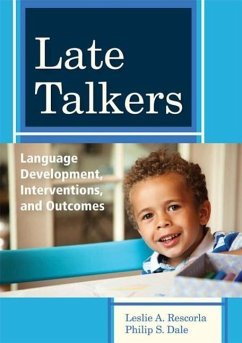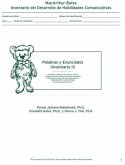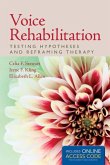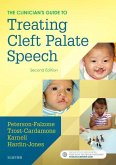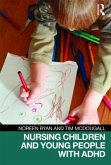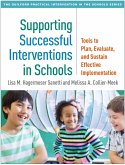Late Talkers
Language Development, Interventions, and Outcomes
Herausgeber: Rescorla, Leslie; Dale, Philip
Late Talkers
Language Development, Interventions, and Outcomes
Herausgeber: Rescorla, Leslie; Dale, Philip
- Broschiertes Buch
- Merkliste
- Auf die Merkliste
- Bewerten Bewerten
- Teilen
- Produkt teilen
- Produkterinnerung
- Produkterinnerung
What does the research tell us about late talkers, and what are the key implications for clinical practice? Discover the latest findings in this important volume, a comprehensive survey of 30+ years of research about young children with delayed expressive language. More than 25 top researchers explore the causes and characteristics of late language emergence, long-term outcomes for late talkers, effective intervention approaches, and future directions for new research studies. An essential addition to the literature on language development!
Andere Kunden interessierten sich auch für
![MacArthur Inventario del Desarrollo de Habilidades Comunicativas (Inventario) MacArthur Inventario del Desarrollo de Habilidades Comunicativas (Inventario)]() Donna Jackson-MaldonadoMacArthur Inventario del Desarrollo de Habilidades Comunicativas (Inventario)31,99 €
Donna Jackson-MaldonadoMacArthur Inventario del Desarrollo de Habilidades Comunicativas (Inventario)31,99 €![Voice Rehabilitation: Testing Hypotheses and Reframing Therapy Voice Rehabilitation: Testing Hypotheses and Reframing Therapy]() Celia F StewartVoice Rehabilitation: Testing Hypotheses and Reframing Therapy94,99 €
Celia F StewartVoice Rehabilitation: Testing Hypotheses and Reframing Therapy94,99 €![The Clinician's Guide to Treating Cleft Palate Speech The Clinician's Guide to Treating Cleft Palate Speech]() Sally J Peterson-FalzoneThe Clinician's Guide to Treating Cleft Palate Speech86,99 €
Sally J Peterson-FalzoneThe Clinician's Guide to Treating Cleft Palate Speech86,99 €![Nursing Children and Young People with ADHD Nursing Children and Young People with ADHD]() Noreen RyanNursing Children and Young People with ADHD38,99 €
Noreen RyanNursing Children and Young People with ADHD38,99 €![Communication and Symbolic Behavior Scales (Csbs), Normed Edition, Test Kit Communication and Symbolic Behavior Scales (Csbs), Normed Edition, Test Kit]() Amy M WetherbyCommunication and Symbolic Behavior Scales (Csbs), Normed Edition, Test Kit288,99 €
Amy M WetherbyCommunication and Symbolic Behavior Scales (Csbs), Normed Edition, Test Kit288,99 €![Communication and Symbolic Behavior Scales (Csbs), Normed Edition, Record Forms and Caregiver Questionnaires Communication and Symbolic Behavior Scales (Csbs), Normed Edition, Record Forms and Caregiver Questionnaires]() Amy WetherbyCommunication and Symbolic Behavior Scales (Csbs), Normed Edition, Record Forms and Caregiver Questionnaires81,99 €
Amy WetherbyCommunication and Symbolic Behavior Scales (Csbs), Normed Edition, Record Forms and Caregiver Questionnaires81,99 €![Supporting Successful Interventions in Schools Supporting Successful Interventions in Schools]() Lisa M Hagermoser SanettiSupporting Successful Interventions in Schools46,99 €
Lisa M Hagermoser SanettiSupporting Successful Interventions in Schools46,99 €-
-
-
What does the research tell us about late talkers, and what are the key implications for clinical practice? Discover the latest findings in this important volume, a comprehensive survey of 30+ years of research about young children with delayed expressive language. More than 25 top researchers explore the causes and characteristics of late language emergence, long-term outcomes for late talkers, effective intervention approaches, and future directions for new research studies. An essential addition to the literature on language development!
Hinweis: Dieser Artikel kann nur an eine deutsche Lieferadresse ausgeliefert werden.
Hinweis: Dieser Artikel kann nur an eine deutsche Lieferadresse ausgeliefert werden.
Produktdetails
- Produktdetails
- Verlag: Brookes Publishing Company
- Seitenzahl: 416
- Erscheinungstermin: 19. Juni 2013
- Englisch
- Abmessung: 249mm x 181mm x 21mm
- Gewicht: 694g
- ISBN-13: 9781598572537
- ISBN-10: 1598572539
- Artikelnr.: 37153608
- Herstellerkennzeichnung
- Libri GmbH
- Europaallee 1
- 36244 Bad Hersfeld
- gpsr@libri.de
- Verlag: Brookes Publishing Company
- Seitenzahl: 416
- Erscheinungstermin: 19. Juni 2013
- Englisch
- Abmessung: 249mm x 181mm x 21mm
- Gewicht: 694g
- ISBN-13: 9781598572537
- ISBN-10: 1598572539
- Artikelnr.: 37153608
- Herstellerkennzeichnung
- Libri GmbH
- Europaallee 1
- 36244 Bad Hersfeld
- gpsr@libri.de
Leslie A. Rescorla, Ph.D., is Professor of Psychology and Director of the Child Study Institute and the Thorne Early Childhood Programs at Bryn Mawr College. Educated at Radcliffe, the London School of Economics, and Yale, she obtained clinical training at the Yale Child Study Center, the Philadelphia Child Guidance Center, and the Children's Hospital of Philadelphia. Dr. Rescorla's research interests include language delays in young children, longitudinal patterns of school achievement, and empirically based assessment of emotional and behavioral problems. Philip S. Dale, Ph.D., is Professor in Departments of Psychology, Linguistics, and Speech and Hearing Sciences at University of Washington. Dr. Dale's research interests include assessment of young children's language, language development in exceptional populations including linguistically precocious children, early language and cognition, and the effects of various models of intervention for young children with disabilities. Edith L. Bavin, Ph.D., Honorary Professor, School of Psychological Science, Faculty of Science, Technology and Engineering, La Trobe University, Melbourne, Victoria 3086, Australia Edith L. Bavin obtained her Ph.D. at the University of Buffalo. Her early research was on the acquisition of Warlpiri, an indigenous language spoken in central Australia. More recent research has been on specifi c language impairment, focusing on memory. She is a chief investigator on the Early Language in Victoria Study, a longitudinal study on the natural history of language impairment and literacy development. Other current research is the language processing of children with autism using eye tracking and the language and the cognitive development of young children with cochlear implants. She served as editor of the Journal of Child Language 2006--2012 and edited the Cambridge Handbook of Child Language, published by Cambridge University Press in 2009. Dorthe Bleses, Ph.D., Professor, Center Director, Center for Child Language, Institute for Language and Communication, University of Southern Denmark, Campusvej 55, DK-5230 Odense M, Denmark Dorthe Bleses is a linguist and applied researcher in early childhood language and literacy development, educational interventions, and development of assessment tools. She directs the Center for Child Language at the University of Southern Denmark. Lesley Bretherton, Ph.D., Associate Professor, University of Melbourne, Head of Clinical Psychology, Psychology Service, The Royal Childrenâ (TM)s Hospital, Flemington Road, Parkville, Victoria 3052, Australia Lesley Bretherton is a child and adolescent clinical psychologist. She is currently Head of Clinical Psychology at The Royal Childrenâ (TM)s Hospital, Clinical Associate Professor in Psychological Sciences at the University of Melbourne, and Honorary Fellow at Murdoch Childrens Research Institute. Her research interests include child language and cognitive development and child psychopathology. She undertook study leave with Professor Dorothy Bishop at the University of Oxford and is a reviewer of research project grants and manuscripts for a variety of journals and for the National Health and Medical Research Council. She has been a member of the Early Language in Victoria Study since 2000. Stephen Camarata, Ph.D., Professor, Hearing and Speech Sciences, Vanderbilt University School of Medicine, 1215 21st Avenue South, Suite 8310, Nashville, TN 37232 Stephen Camarata is a nationally and internationally renowned clinician-scientist who studies late-talking children. His research focuses on the assessment and treatment of speech and language disorders in children with disabilities such as autism, Down syndrome, and specific language impairment. He also studies children whose late onset of talking appears to be a natural developmental stage rather than a symptom of a broader developmental disability. Christine Dollaghan, Ph.D, Professor, Callier Center for Communication Disorders, University of Texas at Dallas, 1966 Inwood Road, A.128, Dallas, TX 75235 Christine Dollaghan is a professor at the University of Texas at Dallas. Her research interests include child language development and disorders, the validity of diagnostic measures, and the latent structure of diagnostic categories. Her publications include The Handbook of Evidence-Based Practice in Communication Disorders (Paul H. Brookes Publishing Co., 2007). She was awarded the Honors of the American Speech-Language-Hearing Association in 2012. Cindy Earle, M.A., Speech-Language Pathologist, The Hanen Centre, 1075 Bay Street, Suite 515, Toronto, ON M5S 2B1, Canada Cindy Earle has worked as a speech-language pathologist with The Hanen Centre for more than 30 years. She is the program director for Target Word--The Hanen Program for Parents of Children who are Late Talkers and the author of the Target Word--Making Hanen Happen Leaders Guide (The Hanen Centre, 2011) and the Target Word Parent Handbook, Third Edition (The Hanen Centre, 2011). Anne Fernald, Ph.D., Associate Professor, Josephine Knotts Knowles Professor of Human Biology, Department of Psychology, Stanford University, 450 Serra Mall, Stanford, CA 94305 Anne Fernald has done pioneering research on the early development of skill in language processing, developing high-resolution measures of the time course of infantsâ (TM) understanding as they learn to interpret language from moment to moment. In longitudinal studies with English- and Spanish-learning children from advantaged and disadvantaged families, this research reveals the vital role of early language experience in strengthening speech processing effi ciency, which in turn facilitates language learning. A central goal of this research program is to help parents understand that they play a crucial role in providing their infant with early linguistic nutrition and language exercise. Marc E. Fey, Ph.D., CCC-SLP, was emeritus professor for the Hearing and Speech Department at the University of Kansas Medical Center. He published numerous articles, chapters, and software programs on children's speech and language development and disorders and wrote and edited three books on child-language intervention. He was editor of the American Journal of Speech-Language Pathology from 1996 to 1998 and Chair of the American Speech-Language Hearing Association's (ASHA) publications board from 2003 to 2005. He received the Kawana Award for Lifetime Achievement in Publications and the Honors of the Association from ASHA. In Memory of Marc E. Fey The field of communication sciences lost a remarkable leader when Marc Fey passed away on September 12, 2023. At Brookes, we will remember him as the dedicated Co-Series Editor of the Communication and Language Intervention (CLI) book series, which he helped direct and expand for many years. Marc was not only a series editor but also a volume editor/author. One of those titles, Treatment of Language Disorders in Children, now in its second edition and slated for a third, has become a classic text for speech-language pathologists, for its balanced examination of interventions for emerging communication and language as well as more advanced language and literacy. A strong supporter of evidence-based practice, Marc brought his passion for research and commitment to well-designed intervention studies to the selection process for the CLI series. Those books benefited from his keen editorial and writing skills. Our staff who had the pleasure of working with him will remember many enjoyable moments at CLI Board meetings and his collaborative, encouraging leadership. His legacy will live on in the volumes he helped to envision and create for the field, and the difference he made in the lives of so many children with speech and language disorders. Lizbeth H. Finestack, Ph.D., CCC-SLP, is an associate professor at the University of Minnesota in the Department of Speech-Language-Hearing Sciences. She is also a speech-language pathologist certified by the American Speech-Language Hearing Association. Dr. Finestack's long-term research aim is to identify efficient and effective language interventions for children and adolescents with neurodevelopmental disorders, including children with developmental language disorder, Down syndrome, fragile X syndrome, or autism spectrum disorder. She has built a research program focused on developing new child language intervention techniques, better understanding the language profiles of children and adolescents with differing neurodevelopmental disorders, and measuring intervention outcomes of individuals with different language and cognitive profiles. Luigi Girolametto, Ph.D., Professor, Department of Speech-Language Pathology, University of Toronto, 500 University Avenue #160, Toronto, Ontario M5G 1V7, Canada Luigi Girolametto is a professor in the Department of Speech-Language Pathology at the University of Toronto. He teaches child language disorders and intervention. Current research in his Child Language Lab focuses on 1) parent-focused language intervention, 2) the development of emergent literacy skills in preschoolers, and 3) language acquisition in bilingual preschoolers. Dr. Girolametto's interests include the efficacy of language intervention and professional development. Marianna E. Hayiou-Thomas, D.Phil. (Oxon), Department of Psychology, University of York, Heslington, York, YO10 5DD, United Kingdom Following completion of her doctoral work at the University of Oxford on cognitive processing in children with specifi c language impairment, Marianna E. Hayiou-Thomas joined the Twins Early Development Study for her postdoctoral training in behavioral genetics. Since then, she has combined her work in behavioral genetics with experimental approaches in order to examine the etiology of language impairment over the course of development, as well as its relationship to literacy. James Law, Ph.D., Professor of Speech and Language Science, Institute of Health and Society, School of Education, Communication and Language Sciences, Newcastle University, Victoria Road, Newcastle-upon-Tyne, NEI 7RU, United Kingdom James Law graduated with a degree in linguistics before qualifying as a speech and language therapist. His principal research interests are child language and language learning diffi culties, evidence-based practice and intervention, and mapping longitudinal outcomes for children with language diffi culties. He has had a wide range of research funding, most recently as a principal investigator on the £1.5m Better Communication Research Programme in the United Kingdom and the Centre for Research Excellence in Child Language in Victoria, Australia. Michelle MacRoy-Higgins, Ph.D., Assistant Professor, Hunter College, The City University of New York, Brookdale Campus, 425 East 25th Street, Mailbox #727, New York, NY 10010 Michelle MacRoy-Higgins is Speech-Language Pathologist and Assistant Professor at Hunter College, The City University of New York. Her research and clinical interests include language and phonological development and disorders in children and children with autism spectrum disorders. Dr. Marchman earned her doctoral degree in Developmental Psychology from the University of California, Berkeley, and was a postdoctoral fellow at the University of California, San Diego. She served on the faculty at the University of Wisconsinâ "Madison and the University of Texas at Dallas and was named Distinguished Scholar at the Callier Center for Communication Disorders. She is currently a research scientist in the Department of Psychology at Stanford University and the Department of Developmental-Behavioral Pediatrics at Stanford University School of Medicine. Dr. Marchman has conducted research in several areas of language and cognitive development, language disorders, and early childhood development. Her most recent work focuses on individual differences in language-processing efficiency and vocabulary development in monolingual English and bilingual (Spanish/English) children born full term and preterm. Dr. Marchman is a member of the MacArthur-Bates CDI Advisory Board, the developer of the CDI Scoring Program, and a contributor to Web-CDI, the CDI-CAT, and Wordbank. Rhea Paul, Ph.D., CCC-SLP, is a professor and founding director of the speech-language pathology graduate program at Sacred Heart University in Fairfield, Connecticut, an affiliate at Haskins Laboratories, and Professor Emerita at Southern Connecticut State University. She received her B.A. from Brandeis University, her masterâ (TM)s degree in reading and learning disabilities from the Harvard Graduate School of Education, and her Ph.D. in communication disorders from the University of Wisconsin-Madison. She has been a principal investigator on research projects on language disorders and autism funded by the National Institute on Deafness and Other Communication Disorders, the National Institute of Child Health and Development, the National Alliance for Autism Research, Autism Speaks, the Meyer Memorial Trust, and the Oregon Medical Foundation, and was a principal investigator at the Yale Autism Center of Excellence. She is the author of more than 100 refereed journal articles, 50 book chapters, and ten books. Along with colleague Donia Fahim, she hosts the podcast Let's Talk about Super Special Kids and Cake on iTunes and Spotify, aimed at supporting parents of children with disabilities. In 1996, she received the Editor's Award from the American Journal of Speech-Language Pathology and was awarded the inaugural Ritvo/Slifka Award for Innovative Clinical Research by the International Society for Autism Research in 2010. She has been a fellow of the American Speech-Language Hearing Association since 1991 and received Honors of the Association in 2014. Barbara Zurer Pearson, Ph.D., has conducted research for more than 35 years on first and second language acquisition with a special emphasis on young bilingual and bi-dialectal speakers. Her most recent book is Raising a Bilingual Child, published in English by Random House, in Spanish by Bilingual Readers, in Polish by Media Rodzina, and in Mandarin by Beijing Language and Culture University Press. She is a co-author, with Seymour, Roeper, de Villiers & de Villiers of the Diagnostic Evaluation of Language Variation tests from Ventris Learning. Nan Bernstein Ratner, Ed.D., Professor and Chair, Department of Hearing and Speech Sciences, The University of Maryland, College Park, 0100 Lefrak Hall, College Park, MD 20742 Nan Bernstein Ratner is Professor and Chair, Department of Hearing and Speech Sciences, The University of Maryland, College Park. She has published widely in the areas of typical and atypical language development, fluency and stuttering, and parent-child interaction. She is the coauthor of the texts Psycholinguistics (Harcourt Brace College Publishers, 1998) and The Development of Language, Eighth Edition (Pearson, 2012), both with Jean Berko Gleason, and A Handbook on Stuttering, Sixth Edition (Delmar Cengage Learning, 2008), with the late Oliver Bloodstein. She is a Fellow of the American Speech-Language-Hearing Association. Dr. Rice received her doctoral degree from the University of Kansas, where she is University Distinguished Professor of Speech-Language-Hearing and Director of the Child Language Doctoral Program and the Merrill Advanced Studies Center. She has held Visiting Scientist appointments at the Center for Cognitive Science at the Massachusetts Institute of Technology (MIT) and the Harvard Graduate School of Education. She has extensive research and clinical experience with children with specific language impairment (SLI). Early in her career she worked as a speech-language pathologist in public schools. In collaboration with Kim A. Wilcox, she established the demonstration Language Acquisition Preschool (LAP) at the University of Kansas. Her current research addresses several aspects of the condition of SLI: social and academic consequences, morphology, lexical learning, and preschool language intervention. Her publications include the edited volumes The Teachability of Language and Toward a Genetics of Language, as well as numerous journal articles and invited chapters. Richard G. Schwartz, Ph.D., Presidential Professor, Ph.D. Program in Speech- Language-Hearing Sciences, The Graduate Center, The City University of New York, 365 Fifth Avenue, New York, NY 10016 Richard G. Schwartz is a speech-language pathologist who has conducted research on typical and atypical language acquisition in toddlers and school-age children. His research interests have included early phonology and lexical acquisition in children with specifi c language impairment (SLI), lexical and sentence processing in children with SLI, children with auditory processing disorders, and the neurological bases of childhood language impairments. He has published extensively in these areas. Donna J. Thal, Ph.D., holds a master of science degree in speech pathology and audiology from Brooklyn College and a doctorate in speech and hearing sciences from the Graduate School and University Center of the City University of New York (CUNY). She has been a postdoctoral fellow at the Center for Research in Language at UCSD, an assistant professor at Hofstra University, and an assistant professor at Queens College of CUNY. Dr. Thal is a developmental psycholinguist and a certified and licensed speech-language pathologist who has conducted research in a number of areas, including normal and disordered development of language and cognition, children with focal brain injury, and children with delayed onset of language. She has also carried out studies of language development in Spanish-speaking infants and toddlers. Her most recent work focuses on early identification of risk for clinically significant language impairment and is funded by a grant from the National Institute of Deafness and Other Communicative Disorders (NIDCD), within the National Institutes of Health. Dr. Thal is an editorial consultant for language for the Journal of Speech, Language, and Hearing Research and the American Journal of Speech-Language Pathology. She was the California State nominee for the American Speech-Language-Hearing Foundation Outstanding Clinical Achievement Award in 1996, received the Monty Distinguished Faculty Award from SDSU 1998 and the Albert W. Johnson Research Lecturer Award from SDSU in 1999, and was the Wang Family Excellence Award nominee from SDSU in 2000. She served a 4-year term on the Communicative Disorders Review Committee for the NIDCD from 1998 to 2002. Dr. Thal is a co-author of the MacArthur Communicative Development Inventories. J. Bruce Tomblin, Ph.D., D.C. Spriestersbach Distinguished Professor, Department of Communication Sciences and Disorders, University of Iowa, Iowa City, IA 52242 J. Bruce Tomblin is a Fellow and Honors recipient of the American Speech-Language- Hearing-Association. He also received the Callier Prize in Communication Disorders. He is a speech-language pathologist holding the Certifi cate of Clinical Competence in Speech-Language Pathology. His research has been concerned with the causes, course, and consequences of developmental language impairments. This research has focused on children with specifi c language impairment and children with hearing loss. Werner Vach, Ph.D., Professor, Clinical Epidemiology, University Medical Center Freiburg, Germany, Stefan-Meier-Str. 26, D-79104 Freiburg, Germany Werner Vach is statistician with a diploma and a Ph.D. from the Department of Statistics, University of Dortmund, Germany. He has been a professor of statistics at the Faculty of Medicine and at the Faculty of Humanities, University of Southern Denmark. Currently he is a professor of clinical epidemiology at the University of Freiburg. He has worked together with researchers from medicine, linguistics, archeology, and anthropology on both applied projects and methodological issues. Susan Ellis Weismer, Ph.D., Oros-Bascom Professor, Department of Communication Sciences and Disorders, Associate Dean for Research, College of Letters and Science, University of Wisconsin-Madison, 1500 Highland Avenue, Madison, Wisconsin 53705 Susan Ellis Weismer is Oros-Bascom Professor of Communication Sciences and Disorders and Principal Investigator at the Waisman Center. Her program of research focuses on understanding the developmental course and mechanisms underlying language acquisition in late talkers, specific language impairment, and autism spectrum disorders. Her research has been funded by the National Institutes of Health for more than 25 years. Elaine Weitzman, M.Ed., Adjunct Professor, Department of Speech-Language Pathology, University of Toronto; Executive Director, The Hanen Centre, 1075 Bay Street, Suite 515, Toronto, ON M5S 2B1, Canada Elaine Weitzman is Executive Director of The Hanen Centre, Toronto, Canada, and Adjunct Professor in the Department of Speech-Language Pathology at the University of Toronto. Ms. Weitzman is coauthor of three resources for caregivers on how to facilitate childrenâ (TM)s language and literacy development: It Takes Two to Talk: A Practical Guide for Parents of Children with Language Delays (The Hanen Centre, 2004); Learning Language and Loving It: A Guide to Promoting Childrenâ (TM)s Social, Language, and Literacy Development in Early Childhood Settings (The Hanen Centre, 2002); and ABC and Beyond: Building Emergent Literacy in Early Childhood Settings (The Hanen Centre, 2010). Her research has focused on the effi cacy of caregiver-implemented early language intervention. Stephen R. Zubrick, Ph.D., Winthrop Professor, Centre for Child Health Research, The University of Western Australia, Telethon Institute for Child Health Research, 100 Roberts Road, Subiaco, Western Australia 6008, Australia Stephen R. Zubrick is Winthrop Professor of Research at The University of Western Australia. Trained at the University of Michigan in audiology, speech pathology, and psychology, he is one of the founding investigators of the Longitudinal Study of Australian Children and is a leading expert in population studies of child development. For the past decade, he has been the Head of the Division of Population Science at the Telethon Institute for Child Health Research. Catherine L. Taylor, Ph.D., PGradDipHlthSc, BAppSc, Professor, The University of Western Australia, Telethon Institute for Child Health Research, 100 Roberts Road, Subiaco, Western Australia 6008, Australia Catherine L. Taylorâ (TM)s primary research is in language development and disorders in childhood and related developmental outcomes, such as school readiness, school achievement, and social and emotional well-being. Her research investigates individual differences in language and literacy development, what factors account for these differences, and what these differences mean for childrenâ (TM)s progress at school and through life. The overarching aim of this research is to contribute to the evidence base that delivers equitable developmental opportunities for children, particularly in the early years.

